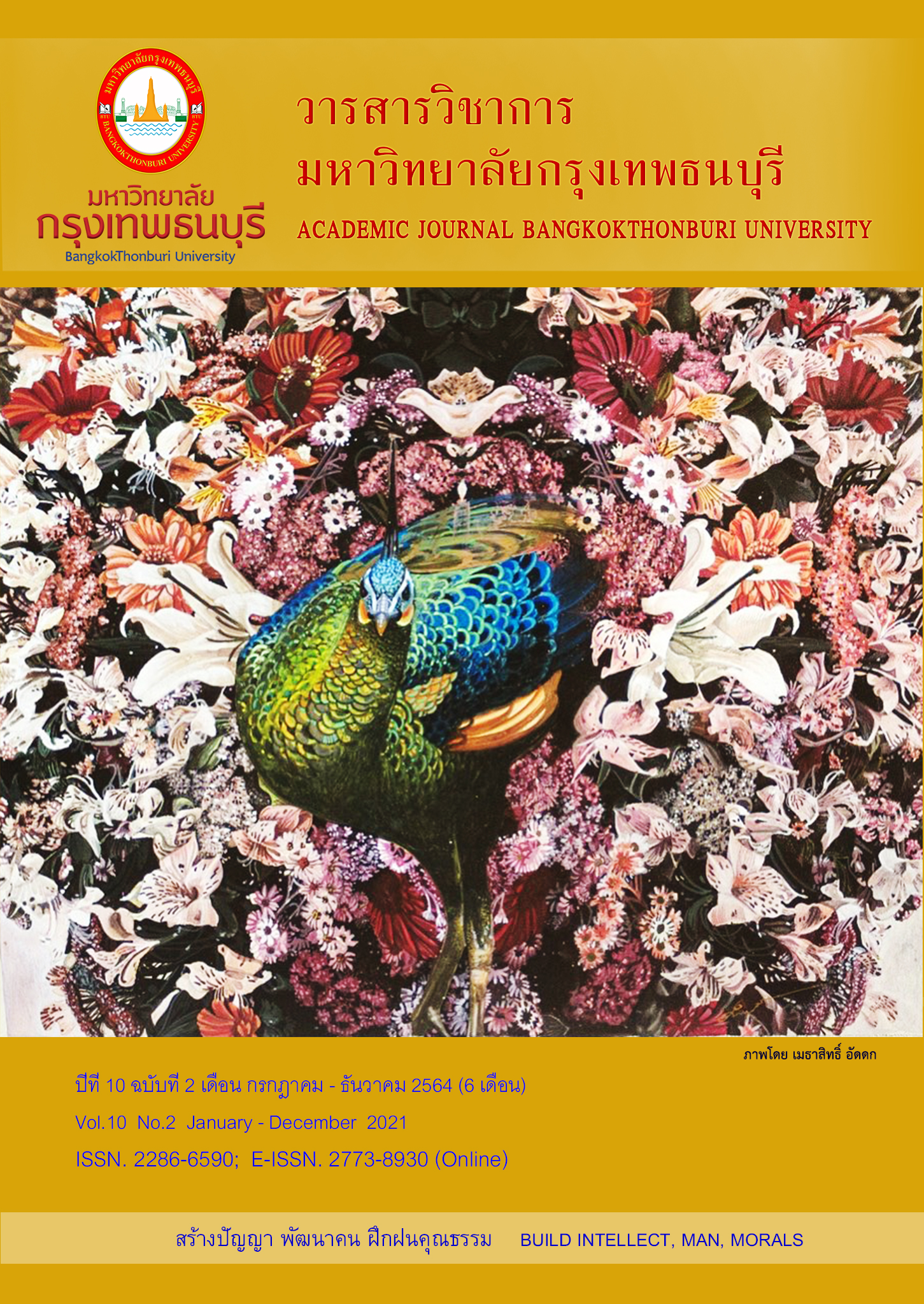The acceptance and use of taxi applications in Bangkok and metropolitan areas : taxi drivers’ perspectives
Main Article Content
Abstract
The objectives of this research were: 1) to study taxi driver’s usage behavior on a taxi calling application in Bangkok and metropolitan area and 2) to study the acceptance and use of taxi calling application in Bangkok and metropolitan areas from the taxi drivers’ point of view by adopting the unified theory of acceptance and use of technology. The model comprised of four dependent variables: - performance expectancy, effort expectancy, social influence, facilities conditions; four moderators: - age, gender, experience, voluntariness of use; one mediator: - behavioral intention; and one dependent variable: - user behavior. Data were derived from questionnaires survey with 400 respondents and analyzed. The results revealed that all variables in the model obtained the high level of average score. The model component analysis was consistent with the empirical data. It was found that the taxi driver's usage behavior on the taxi calling application was directly influenced by two variables, namely facilities conditions and behavioral intention. In addition, the analysis showed that the behavioral intention was most directly influenced by the variable social influence. The results of the research can be used as a guideline for further development of taxi calling applications.
Article Details
References
ชยาภรณ์ กิติสิทธิชัย (2560). ปัจจัยที่มีผลต่อการยอมรับเทคโนโลยีการใช้งานกระเป๋าเงินอิเล็กทรอนิกส์ (E-Wallet) ในการซื้อสินค้าของผู้บริโภคในจังหวัดกรุงเทพมหานคร. การค้นคว้าอิสระปริญญามหาบัณฑิต. มหาวิทยาลัยกรุงเทพ.
โชติมา ชูกุล. (2559). ปัจจัยที่มีอิทธิพลต่อการเลือกใช้บริการแอพพลิเคชั่นเรียกรถยนต์โดยสารของ
ผู้บริโภคในเขตกรุงเทพมหานครและปริมณฑล. การค้นคว้าอิสระปริญญามหาบัณฑิต.มหาวิทยาลัยธรรมศาสตร์.
พลฏฐ์ อินถารต และชุติมา เบี้ยวไข่มุก. (2560). ปัจจัยต่อการยอมรับและใช้ E-Wallet. วิทยานิพนธ์ปริญญามหาบัณฑิต. มหาวิทยาลัยรังสิต.
พงศกร ง่วนสำอางค์. (2560). พฤติกรรมและความพึงพอใจของผู้โดยสารต่อการใช้แอปพลิเคชั่นแท็กซี่. การค้นคว้าอิสระปริญญามหาบัณฑิต. มหาวิทยาลัยกรุงเทพ.
พิมพ์พรรณ สุวรรณศิริศิลป์. (2559). ปัจจัยที่ส่งผลต่อการยอมรับและใช้งานบริการแบบพร้อมเพย์.การค้นคว้าอิสระปริญญามหาบัณฑิต.มหาวิทยาลัยธรรมศาสตร์.
พูลพงศ์ สุขสว่าง. (2557). หลักการวิเคราะห์โมเดลสมการโครงสร้าง. วารสารมหาวิทยาลัยนราธิวาสราชนครินทร์, 6(2), 136-145.
ภัทราวดี วงศ์สุเมธ. (2556). ปัจจัยที่มีอิทธิพลต่อการยอมรับและการใช้งานระบบการเรียนผ่านเว็บ. วารสารนักบริหาร, 33(3), 3-10.
สิทธิชัย ภูษาแก้ว. (2560). ปัจจัยการยอมรับเทคโนโลยีที่มีผลต่อการตัดสินใจใช้บริการ Grab ของ ผู้บริโภคในกรุงเทพมหานคร. การค้นคว้าอิสระปริญญามหาบัณฑิต. มหาวิทยาลัยกรุงเทพ.
อุทัยวรรณ ของสิริวัฒนกุล. (2562). ทางรอดแท็กซี่ไทย....ในยุค 4.0. ศูนย์วิจัยธนาคารออมสิน. สืบค้นเมื่อ 6 มกราคม 2563 จาก https://www.gsbresearch.or.th/gsb/economics/6625/
เอกลักษณ์ ธนเจริญพิศาล, (2554). ความตระหนักและการยอมรับการนำระบบการจัดการสิ่งแวดล้อม (ISO 14001) มาใช้ในองค์การภาครัฐ:ศึกษากรณีสำนักงานนโยบายและแผนทรัพยากรธรรมชาติและสิ่งแวดล้อม. วิทยานิพนธ์ปริญญามหาบัณฑิต. คณะพัฒนาสังคมและสิ่งแวดล้อม. สถาบันบัณฑิตพัฒนบริหารศาสตร์
อัจฉราวรรณ งามญาณ, (2554). อันเนื่องมาแต่สูตรของยามาเน่. วารสารบริหารธุรกิจ, 34(131). 46-60
Lin, C.P.and Anol, B. (2008). Learning online social support: An investigation of network information technology based on UTAUT. Cyber Psychology & Behavior, 11(3), 268-272.
Venkatesh, V., Morris, M. G., Davis, G. B., & Davis, F. D. (2003). User acceptance of information technology: Toward a unified view. MIS Quarterly, 27(3), 425–478.


